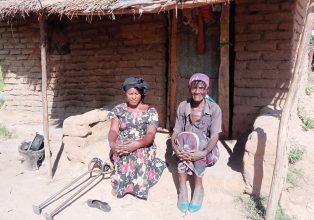Fresh push to legalise abortion
In Senior Chief Chikumbu’s area in Mulanje, an 11-year-old girl was impregnated. She could not keep the pregnancy due to her age, but when the chief stood up for her to get an abortion, Chikumbu was nearly arrested.
“I challenged the police to arrest me if they wished so and prosecute me for simply pushing for the termination of the young girl’s pregnancy,” she recalls.

Luckily, the traditional leader won the battle and the girl’s pregnancy was terminated.
“We have the child in good health now. Had she taken backstreet abortion or kept the pregnancy she would have died,” says Senior Chief Chikumbu.
Data shows that eight in 100 pregnancy-related deaths nationwide are due to unsafe abortions.
The Mulanje case is not isolated as women across the globe and Malawi in particular, opt for abortion for several reasons.
For some young and unmarried persons, the reasons for seeking abortion include shame in the communities fear of parents and friends.
But as well as abortion is illegal in Malawi except when conducted under strict life threatening circumstances determined by qualified medical personnel.
The situation has prompted some local civil society organisations (CSOs) to revive calls for Parliament to pass a Termination of Pregnancy Bill tabled by Chiradzulu West lawmaker Matthews Ngwale in 2021.
A study by the Ministry of Health shows that about 750 000 women induced abortion in 2009, causing between six and 18 percent of all pregnancy-related deaths.
Once passed into law, the Termination of Pregnancy Bill, would among others, allow women to access abortion whenever they feel like not keeping it.
“More grounds for safe abortion will reduce maternal deaths caused by the third killer of pregnant women and girls in the country,” Ngwale argued.
However, the Bill was not discussed in 2021 as Parliament rejected to have it. Currently, the law inherited from Britain in the 1930s only permits health workers to safely terminate a pregnancy when a woman’s life is in danger.
To avoid being jailed for up to 14 years, many women and young girls in the country resort to clandestine abortion with the help of unskilled hands, including traditional birth attendants banned in 2010.
Coalition for the Prevention of Unsafe Abortion (Copua), which is a network of over 60 CSO professionals, institutions and individuals working on research and advocacy on issues of unsafe abortion in Malawi backs Ngwale’s efforts to have abortion legalised.
Copua secretary general Francis Makia says it is worrisome that government is not comfortable with the hospitals to carry out the abortion.
“Yet it is comfortable to have the same hospital handle the women with difficulties resulting from their futile attempt to terminate their pregnancies using unsafe ways,” he says.
He adds that much as abortion remains a punishable crime in the country, a lot of women and girls are opting for unsafe ways resulting in government spending money to address the problems.
According to Copua, most legislators understand why abortion should be made legal in Malawi but “their only fear is their constituents.”
The organisation has since started lobbying traditional leaders to engage their parliamentarians on the matter. Senior Chief Mabulabo of Mzimba is one of the leaders, Copua recently approached.
He says he now fully understands Copua’s concept: “It is indeed true that we are busy sticking to the outdated colonial laws which the same Europeans no longer use. There is need to change our laws on abortion.”
Mubulabo believes members of Parliament are playing hide and seek on the issue because they are afraid of their constituents.
“The truth of the matter is that they are afraid of not retaining their seats in the next elections if they vote for the Bill,” says Mabulabo.
Chikumbu agrees, saying what is missing in the abortion debate is “the clear understanding of the importance of legalising abortion”.
But she is ready to be an ambassador in sensitising Malawians women and girls not to abuse that right should Parliament table the Bill and later the President signs it into law.
Human rights lawyer Godfrey Kangaude says the stumbling block currently is Section 243 of the Penal Code which legalises abortion, but only in special cases.
“I see no difference with just removing the criminal aspect in it,” he observes. “All Malawians and faith leaders agree that it is important to conduct abortion to save the woman’s life.”
However, not everyone agrees with legalising abortion and this includes the Episcopal Conference of Malawi (ECM) and the majority of the faith community.
ECM secretary general Father Henry Saindi says the Roman Catholic Church objects to any law that supports termination of life.
“We say no to abortion of any kind as that is killing,” he says.
Muslim Association of Malawi spokesperson Sheikh Dinala Chabulika also says the Holy Quran is against killing of any kind including abortion.
But until when will the country continue to lose promising young girls to unsafe abortion and will Copua succeed in lobbying Parliament to legalise abortion?
“We are lobbying for it and we hope this fresh push will bear fruit. Abortion law must be revisited,” says Makia.



